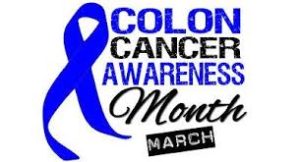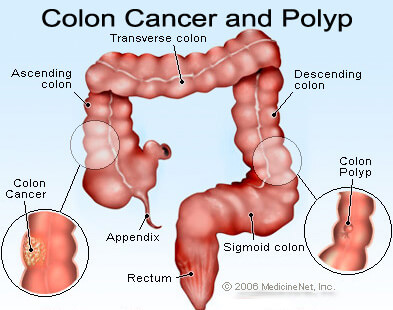 March is Colon Cancer Awareness Month. The colon (also called the large intestine) is a major digestive organ. In 2016, there was an estimated 134,490 new cases of colon cancer. Colorectal cancer (cancer of the colon or rectum) is the 3rd most common cancer among men and women in the United States.
March is Colon Cancer Awareness Month. The colon (also called the large intestine) is a major digestive organ. In 2016, there was an estimated 134,490 new cases of colon cancer. Colorectal cancer (cancer of the colon or rectum) is the 3rd most common cancer among men and women in the United States.
What contributes to development of colorectal cancer?
- Poor diet: Not eating enough veggies, healthy fats and fiber or eating too much red meat have all been associated with an increased risk.
- Nutrient deficiencies: Such as folate.
- Family history: If you have a 1st degree relative your chances of skin cancer are higher. If your relative was diagnosed before age 45, your risk is even higher. One in 5 colorectal cancers carry a family history.
- Being overweight or obese
- Physical inactivity
- Smoking
- Heavy alcohol use
- A personal history of colon polyps or previous cancer.
- If you have Irritable Bowel Disease (IBD): Such as ulcerative colitis (UC) or Crohn’s disease.
- Certain inherited syndromes: Such as Familial Adenomatous Polyposis (FAP), Lynch syndrome, Gardner syndrome or Turcot syndrome.
- If you’re African American or Ashkenazi Jew: These carry a higher risk of colorectal cancer.
- Type 2 diabetes
- Age: Most colorectal cancers are found after age 50.
How to prevent colon cancer and decrease your risk:
Talk to your doctor about your risk. Depending on your history, your doctor may recommend screening tests and suggest ways to reduce your risk. Screening tests can include a stool sample or a screening colonoscopy to check for precancerous or suspicious cells. Colorectal cancer tends to be very slow growing, so it can take 10-15 years before symptoms of colorectal cancer become apparent – this makes screening incredibly important, so it can be caught early when treatment is more likely to be successful.
Get healthy! Talk to your doctor about ways to reduce your risk, such as quitting  smoking, drinking lessalcohol, exercise, losing weight and eating a healthy diet. If you have a condition such as Irritable Bowel Disease or Type 2 diabetes seek treatment and talk to your doctor about reversing your condition and becoming healthier. Even if you have a family history or come from a higher risk ethnic background there are ways to continue to reduce your risk and stay healthy for years to come!
smoking, drinking lessalcohol, exercise, losing weight and eating a healthy diet. If you have a condition such as Irritable Bowel Disease or Type 2 diabetes seek treatment and talk to your doctor about reversing your condition and becoming healthier. Even if you have a family history or come from a higher risk ethnic background there are ways to continue to reduce your risk and stay healthy for years to come!
- NIH National Cancer Institute: https://seer.cancer.gov/statfacts/html/colorect.html
- American Cancer Society: https://www.cancer.org/cancer/colon-rectal-cancer/causes-risks-prevention/risk-factors.html
- Natural Approaches to Gastroenterology, Eric Yarnell, ND, Volume I, p. 589-614

